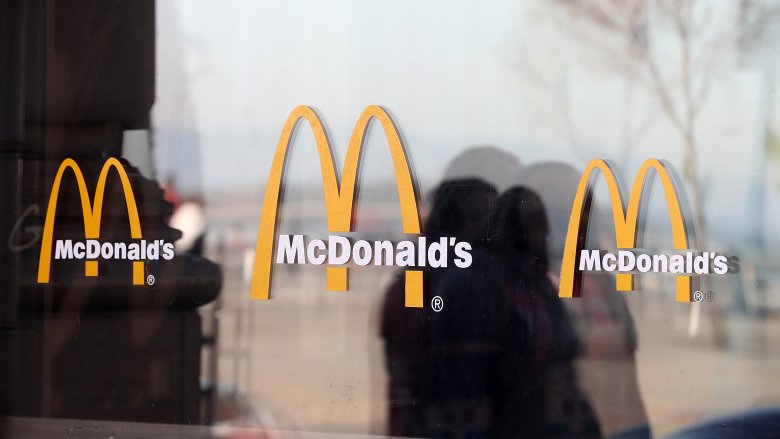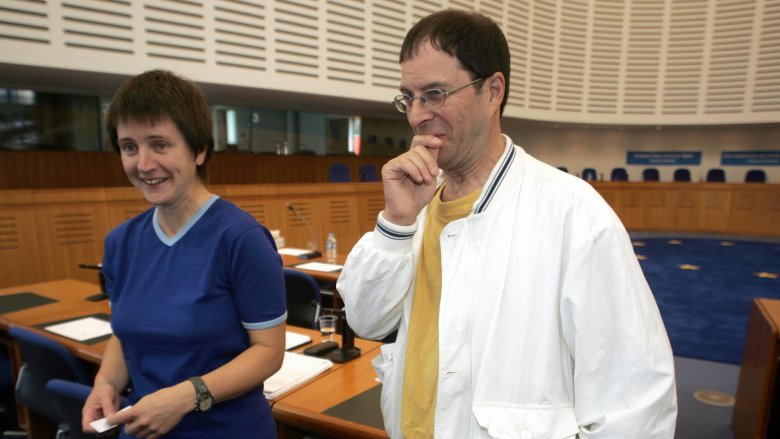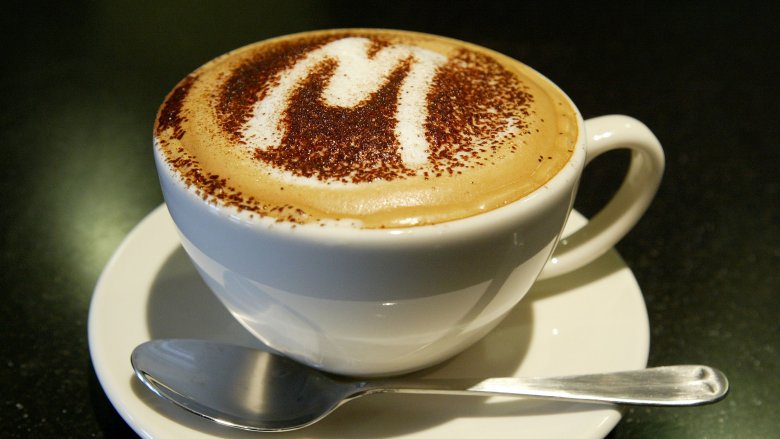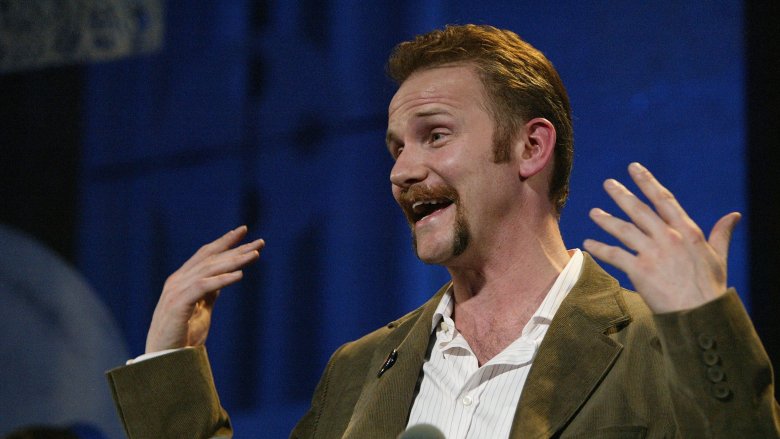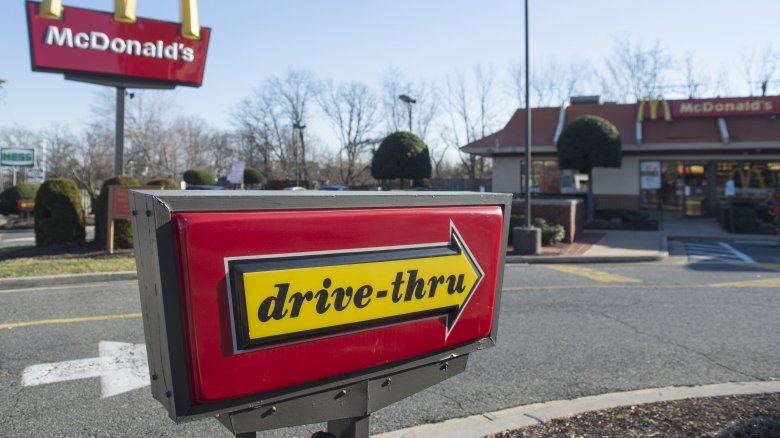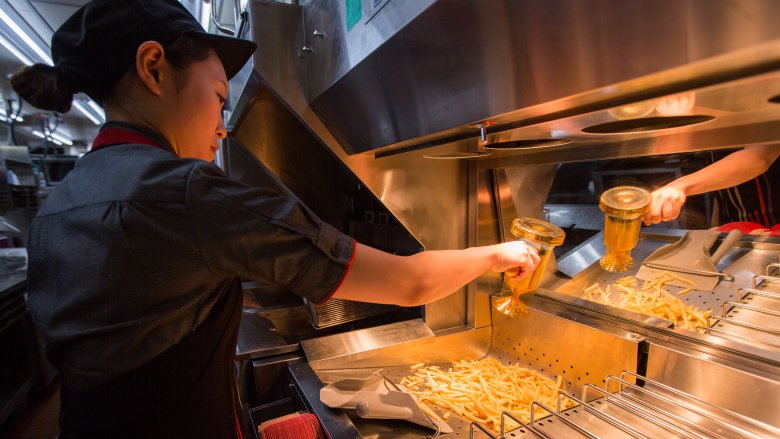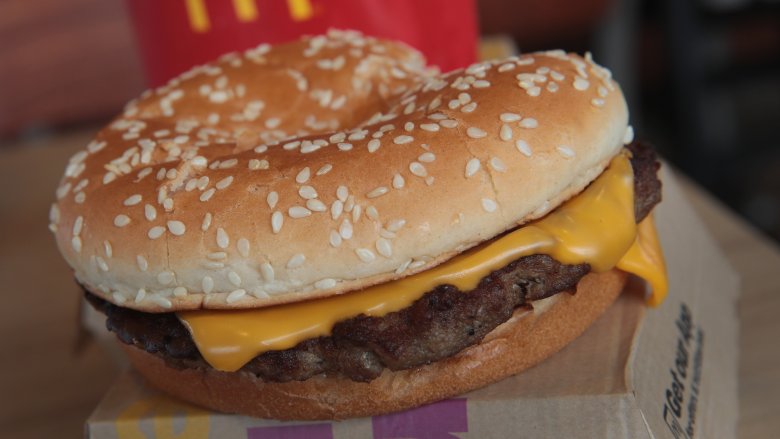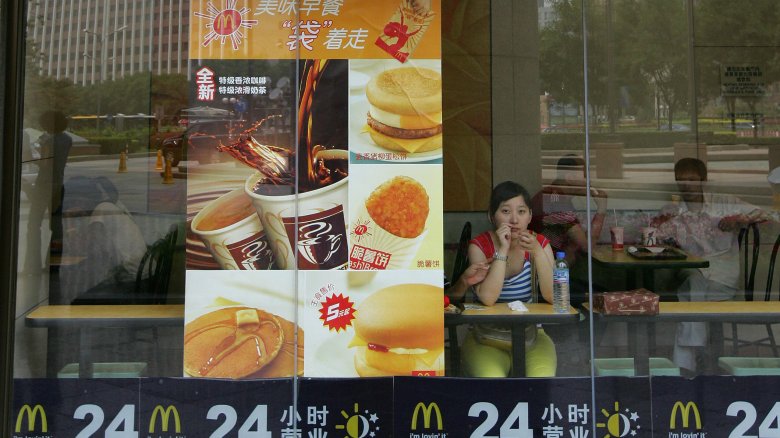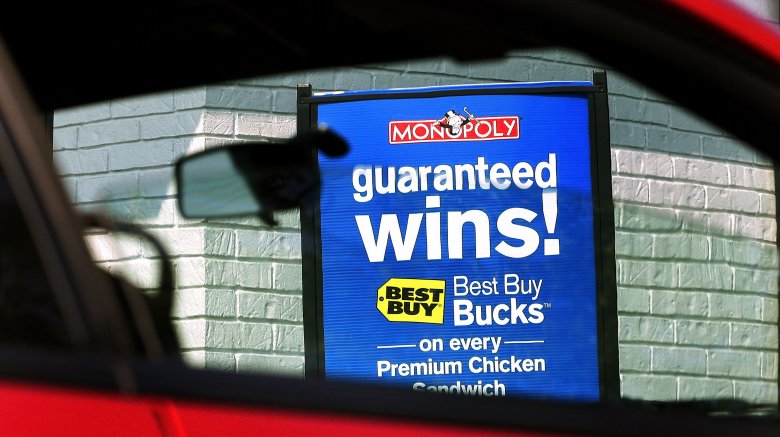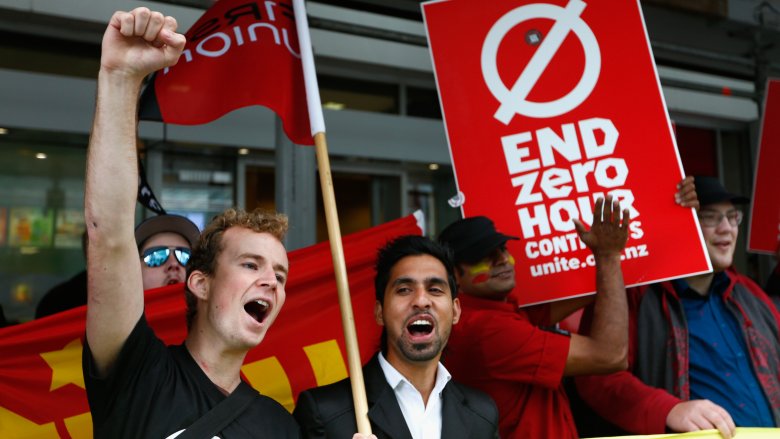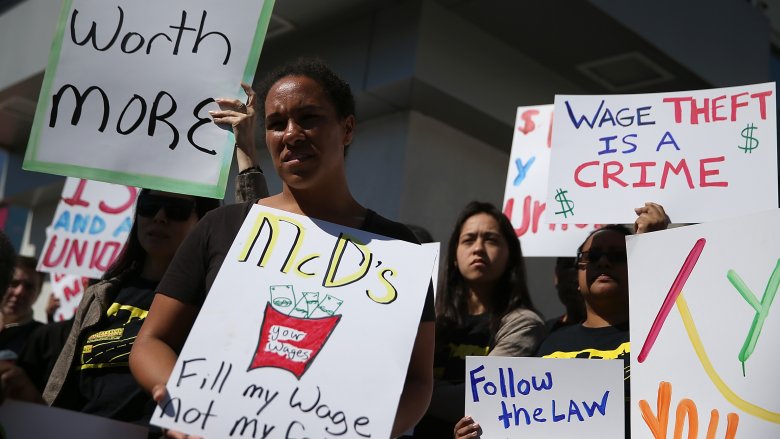The Biggest Scandals To Ever Plague McDonald's
McDonald's is one of the largest corporations on the planet. They make over $20 billion a year in revenue, which is more than some countries. And they employ over a million people across the world; nearly double the entire population of Luxembourg. All in all, they likely shift more hamburgers in every passing moment than most people can possibly imagine. They're not just a restaurant, but a cultural phenomenon and a global institution with brand power the likes of which its competitors could only dream of.
But the history of McDonald's is not clean. In fact, the story of the company isn't just one of success, but of protracted court cases, nutritional controversies, outright lies, labor atrocities, and PR disasters. No company as big as McDonald's can ever survive for long without attracting a scandal — and these are some of the worst to have ever sullied the company's name.
David v. Goliath
In 1986, an environmentalist organization known as the London Greenpeace Group (who aren't related to the ones you're probably thinking of) began distributing leaflets entitled 'What's wrong with McDonald's — everything they don't want you to know,' in which they accused the company of a whole litany of offences against nature, including deforestation, littering, and the mistreatment of animals and workers. The libel case which ensued, filed by McDonald's against five of London Greenpeace's members, was nothing less than epic.
Two of those accused — Helen Steel and David Morris; a part-time bar-worker and an unemployed postman — went to court to prove their accusations against the company. McDonald's utilized a team of lawyers to smother the claims against them, while Steel and Morris represented themselves. The trial lasted years, and resulted in the British court ruling that McDonald's wasn't to blame for mass deforestation or starvation, but was at fault for pretending their food was nutritious and had consciously helped depress wages in the food industry. Morris and Steel were ordered to pay £60,000 in damages after the case, though this was later reduced to £40,000 — and McDonald's, who spent over £10 million on their legal expenses, has never attempted to collect.
Thanks to a lengthy appeals process, the back-and-forth between London Greenpeace and McDonald's lasted for years — but, from day one, the notion of the McDonald's Corporation fighting two struggling workers proved to be something of a problem for the company's image.
Hot coffee
Liebeck v. McDonald's might well be one of America's most infamous court cases. The story itself is well-known: in 1992, a woman named Stella Liebeck was severely burned after spilling a cup of coffee on herself that she'd bought at McDonalds. She then issued a lawsuit against the company for it. The case itself became a legendary example of the 'frivolous lawsuit' — and helped create a narrative in which it appeared that American citizens were levying lawsuits against companies (and each other) for asinine reasons.
The truth, however, is a little different. Firstly, Liebeck suffered third-degree burns across 16 percent of her body, requiring her hospitalization for eight days for skin grafts and other treatments. McDonald's offered her $800 for her trouble, and, when she refused, the resulting court case revealed that McDonald's had been receiving complaints about the extreme heat of their coffee (30 to 40 degrees hotter than that served by other companies) and that 700 people, including children, had been burned before. Apparently, McDonald's had decided that these were insignificant cases when they were selling billions of cups of coffee every year. Liebeck was awarded $200,000 in compensatory damages, reduced to $160,000 because she was judged to be 20 percent responsible for the incident. She also received $2.7 million in punitive damages, later reduced to $480,000. Finally, Liebeck and McDonald's settled for an undisclosed amount. The media, unfortunately, had a field day — and gleefully painted Liebeck as the villain of the story.
Supersized
Super Size Me was a film that, arguably, changed the world. Produced by and starring Morgan Spurlock, the documentary saw Spurlock eat nothing but McDonald's food for a whole month, recording the results on his body and mind all the while. He gained 18 pounds, suffered increased cholesterol, became depressed and generally ended up looking a little bit like Grimace. The film's release was something of a disaster for the public perception of McDonald's — it opened up a topic of conversation that portrayed the company as a specifically negative force in society.
Shortly after the release of Super Size Me, the supersize option was struck off the menu at McDonald's. Although the company has denied any link between the film and their decision to do that, the timing is unlikely to have been coincidental. Since then, fast food restaurants such as McDonald's have made a push to appear more healthy and nutritious, while America's gastronomic culture has seen a shift towards clean eating and health food — for better or worse.
The Virginia racism debacle
In 2015, ten ex-employees of McDonald's in Virginia filed a civil rights suit against the company, accusing it of racism. According to the employees, they had been fired after supervisors suggested that there were "too many black people in the store." On a single day in May 2014, 15 African-American employees had been fired, while those same supervisors had hired a number of white employees only a few months earlier.
Conditions at the three franchise locations, owned by Michael Simon, were just as shocking. One plaintiff, Katrina Stanfield, told the court that she had been regularly harassed, with supervisors claiming that "it's too dark in here." Stanfield's discrimination appeal to the McDonald's higher-ups was ignored after her firing. While the nature of franchising means that McDonald's themselves aren't strictly to blame for the incident, the plaintiffs' lawyer Paul Smith criticized the company for not doing more to protect its workers. And although it's unlikely the scandal hit sales too badly, an online petition calling for damages to be paid towards the workers reached almost 40,000 signatures.
Beef fat fries
Back in 2001, McDonald's was taken to court to fight a suit of $100 million after conceding that its restaurants had been frying its fries in beef fat. Although this might seem innocuous enough, the fact that McDonald's had done nothing to dissuade the perception that its fries were vegetarian didn't exactly go down well with the public. While the company had insisted only vegetable oil was used in the process, the truth was that beef fat was used at its food production plants before the fries were frozen (though that ingredient was listed as "natural flavoring" in the nutritional information) and then re-fried at each restaurant in vegetable oil.
McDonald's promptly apologized, leaving itself open to a suit by lawyer Harish Bharti. Various Jewish and Muslim groups followed, since the use of beef fat is neither kosher nor halal. McDonald's ended up paying millions of dollars to the affronted groups — but still uses beef fat to produce its fries in the U.S.
The whole pink slime thing
Nobody really goes to McDonald's for haute cuisine or fine dining, but most customers do expect their food to be made with some — well, some dignity at the least. Perhaps that's why people were so appalled when the whole pink slime thing happened, back in 2012. It was ABC who broke that particular story, running video footage of gross, pink-tinted slime being produced at a food processing plant and revealing that this "lean, finely textured beef" was present throughout the fast food industry, McDonald's included.
McDonald's (as well as a number of other companies) committed themselves to never using LFTB again (though it's worth pointing out that the FDA did declare it to be totally safe) and the industry fell to pieces. Three plants were closed, hundreds of jobs lost, and the company that had been producing the stuff for McDonald's lost $1.9 billion in business. Only two years later, however, sales had begun to recover — and in 2017 ABC settled a defamation suit leveled by the producer of LFTB after a lengthy jury trial.
Big trouble in little China
McDonald's scandals aren't limited to America alone, of course, and the company isn't going to let something as inconsequential as a national border or two get in the way of a good ol' PR disaster. It was the Chinese who learned this back in 2014, when it was revealed that McDonald's had been serving tainted meat in its restaurants across the country. A secret film showed workers at a food processing plant handling food with their bare hands, repackaging expired food and returning meat which had fallen on the floor into their machinery.
Sales plummeted at China's McDonald's branches, and the company responded first by lying about using products made by the plant, and then by refusing to sever ties with the US-based OSI Group, who owned the processing plant. A number of items, including chicken nuggets, chicken filets, and a range of vegetable products, were taken off the menu. The scandal even reached as far away as Hong Kong and Japan, where sales were similarly affected.
The Monopoly scam
The McDonald's Monopoly tie-in is one of the company's most recognizable and successful marketing schemes. First launched in 1987, the game was simple: you collect pieces of the board by ordering meals at McDonald's and, if you get enough of the right ones, you can win prizes — including a potential $1 million payout. It's a great idea, and must have made the company countless millions of dollars. Just a shame someone rigged it.
An ex-cop named Jerry Jacobson happened to work at the company that printed the game pieces. He came up with the idea to sneakily provide people with winning pieces in exchange for a cut of their prizes. He got away with this for a whole 12 years, defrauding McDonald's for $24 million in the process. The company wasn't blamed for Jacobson's scam, but after the truth came to light thanks to an FBI tip, it gave away $10 million to 55 random customers as a way of saving face. After a lawsuit was issued against them, they then agreed to give another $15 million away at random to 15 customers — and they were forced to do it quietly, so as not to drive up sales. That means McDonald's ended up losing a whole lot of money thanks to the scam, and didn't receive any real goodwill for giving back the money. The fact that they're making a movie about the whole mess is unlikely to help things much, either.
Zero hour
It's not hard to make a solid argument that zero hour contracts (basically a form of employment contract in which you're not guaranteed shifts but aren't obligated to work either) are pretty much an easy way for large corporations to exploit young workers. As a result, companies that utilize them often find themselves on the receiving end of a great deal of criticism.
In 2014, it was revealed that a McDonald's franchise in Pennsylvania had been committing a litany of abuses against zero hour 'guest' workers who had begun working for the corporation on a foreign exchange work program. These employees, many of whom were students, were subjected to 25-hour shifts without overtime pay, and threats on the part of the franchise owner — who was also acting as their landlord and providing inadequate housing in his basement. Eventually, the workers went on strike, despite the franchisee's insistence he had done nothing wrong, and drew attention and support both from within the United States and outside of it. A suit levied against him finally resulted in having to pay out hundreds of thousands of dollars in damages and back pay to 291 workers.
The Fight for 15
Perhaps unsurprisingly, the Pennsylvania strike wasn't exactly the sole example of labor abuses committed by McDonald's over the course of its history. Again in 2014, McDonald's workers around the world joined the picket line in protest against the company's low wages. Dubbed "Fight for 15," after the hourly wage they were attempting to win, saw strikes take place in 150 cities across America, and 33 countries around the world.
According to The Guardian, strikers in Brazil fought against "wage theft, poverty-level pay, and mistreatment of pregnant workers." In Japan, they sought a higher hourly wage. In South Korea, workers protested against low wages, long hours and the lack of stability in their employment. The strikes represented a form of mass solidarity between low-level workers all over the planet, the likes of which has rarely been seen in the history of industrial action. And every one of them were united by a single, common enemy: McDonald's. It was not a good look.
